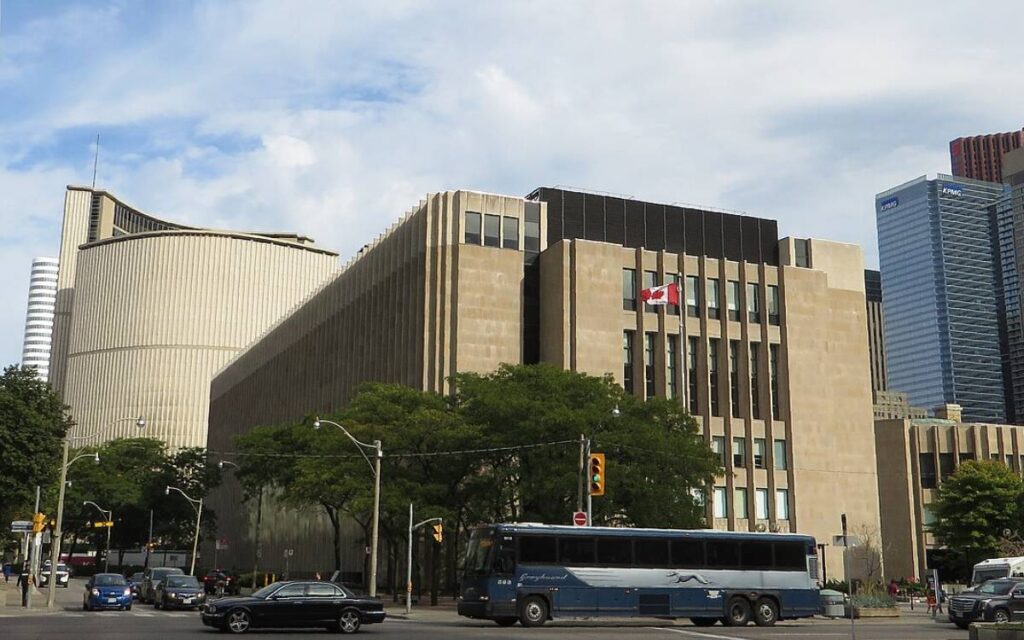
The court did leave in place some restrictions, however. Pictured: Ontario Superior Court of Justice. Photo Credit: Wikimedia Commons.
An Ontario Superior Court of Justice decision has determined that the City of Hamilton has the right to clear homeless encampments, albeit with certain restrictions.
The decision, made by Justice James Ramsay in Heegsma v. Hamilton (City), 2024 ONSC 7154, came after 14 homeless individuals argued through lawyers that the City of Hamilton’s enforcement of its parks by-law enforced between August 2021 and August 2023 breached their right under the Charter to life, liberty and security and to equal benefit of the law.
The applicants were evicted from encampments during that time period.
The decision was just released on Dec. 23, 2024.
While Ramsay’s decision indicates that the City of Hamilton can remove daytime encampments, if the City had prevented the applicants from staying overnight he says the City “might have been in breach of s.7 of the Charter according to British Columbia jurisprudence (Victoria (City) v. Adams, 2009 BCCA 563).”
It appears that any case involving the removal of people staying overnight in encampments would require a separate decision which would heavily depend on if an adequate number of emergency shelter beds are available.
However, Ramsay added that in this specific case the applicants “were not prevented from staying overnight.”
He added, “The City has not prohibited anyone from erecting temporary, overnight shelter.”
The decision continues, “I am asked to extend the right to stay in encampments to public parks in the daytime, that is, not to have to tear down and move every day.”
The applicants also wanted Ramsay to declare that homeless persons be permitted to stay in encampments during the day regardless of whether there is shelter space available since they say not all shelter space is “accessible.”
It was suggested that some persons have accessibility issues if a shelter does not allow animals, while some have an issue if a shelter does allow animals, some want shelters to allow couples while others have an issue with shelters that only allow couples, and some have an issue if a shelter does not permit substance use.
That argument was accepted in a Waterloo court case (Waterloo (Regional Municipality) v. Persons Unknown, 2023 ONSC 670).
In the Waterloo case, Justice Michael Valente determined that the Region could not prevent an overnight temporary structure unless there was enough shelter space and that the shelter space was “truly accessible in that it met the needs of the homeless population.”
On the contrary, in the City of Hamilton decision, Ramsay declares that the accessibility condition is “impossible” to accommodate and “arbitrary.”
“Some people will not stay in a shelter whether it is available or not,” he stated.
In his final paragraphs on the matter, Ramsay concludes that “the life, liberty and security of the applicants are not put at risk by enforcement of the by-law. They are put at risk by homelessness. Encampments contribute to this risk. They are lawless, dangerous, and unsanitary.”
He also writes that “the most vulnerable includes not only the homeless but also the elderly person and the child who want to use a sidewalk or a city park without tiptoeing through used needles and human feces.”
His conclusion is that the City “is trying to find a solution to homelessness” and “has attempted to address the problem,” but “has limited resources and a duty to its housed constituency.”
Ramsay says that he is “well advised” to let the City decide best how to deal with encampments.
“Micro-management by judges will not be productive,” he posits.
As a result of the ruling, it appears as though Hamilton City Council has the liberty to clear permanent encampments, particularly if providing an adequate number of shelter spaces.
The decision in favour of the City has led to calls for Hamilton’s Encampment Protocol to be amended to prohibit encampments in parks, while others have called for an end to encampments in any and all areas of the City.

Based in Hamilton, he reaches hundreds of thousands of people monthly on Facebook, Instagram, TikTok, and Twitter. He has been published in The Hamilton Spectator, Stoney Creek News, and Bay Observer. He has also been a segment host with Cable 14 Hamilton. In 2017, he received the Chancellor Full Tuition Scholarship from the University of Ottawa (BA, 2022). He has also received the Governor General’s Academic Medal. He formerly worked in a non-partisan role on Parliament Hill in Ottawa.






